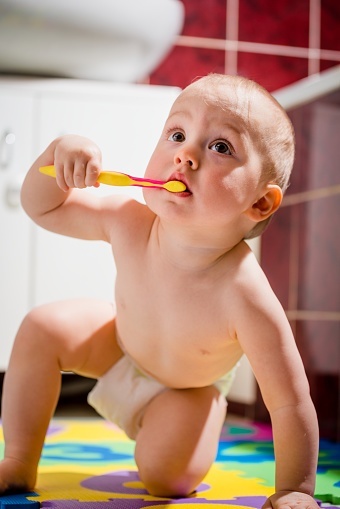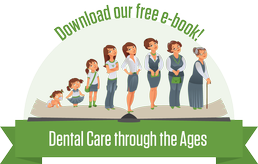By Alissa Gavrilescu on Apr 1, 2016 @ 10:17 AM
This blog is the third in a three-part series on infant teething.
Months of anticipation, drooling and gnawing on teething rings (and everything they can get their little hands on) have culminated into a big millstone: your baby’s first tooth! It’s an exciting – but confusing – time. My son’s bottom two teeth recently made their highly anticipated entrance into the world but it has me wondering: now that my baby has teeth, how do I care for them?
I was at the grocery store the other day and noticed half a dozen brands of baby toothpaste along with baby toothbrushes. Confused and overwhelmed, I texted a few friends (ok, everyone I knew who had a baby in the past 5 years) to help me make sense of caring for his new pearly whites. Friends and family alike responded with opinions as different as could be leaving me even more confused than before.
After speaking with a dental hygienist, I learned a few important tips to keeping my baby’s new teeth healthy:
- Keep them clean. Cleaning your child’s teeth can be as simple as wiping them down with a damp cloth or as elaborate as using an infant toothbrush. Both achieve the same objective and help get your baby used to something rubbing on their tooth (prepping them for good brushing habits later on!). If you want to use toothpaste with fluoride, go ahead! Once your child’s first tooth appears, the American Dental Association (ADA) supports using a very small amount of toothpaste on their brand new bite.
- Keep sugar to a minimum. Sugary substances for babies might not be as obvious as in older children. While your baby isn’t eating candy, there are sugars in other foods and beverages that can create decay for your child’s new teeth. Natural sugars in baby food and fruit juices can be harmful to your baby’s teeth as well as formulas and milk. The sugars found in the bottle collect in your child’s mouth and if left while they sleep, can create baby bottle tooth decay (or what’s known as bottle rot). You can help by wiping down your child’s teeth after a feeding with damp gauze.
- Visit the dentist. Start good oral habits early. Did you know that the ADA recommends taking your child to their first dental visit within six months of getting their first tooth? It’s true! The health of your child’s baby teeth plays an important role in their permanent teeth. A pediatric dentist will teach you how to properly care for baby’s teeth and make recommendations for the right products to care for your baby’s brand new smile.
While your baby’s smile is no longer the gummy, tooth-free grin you’ve been used to…seeing his or her new teeth emerge is an exciting time for a parent. Your baby’s budding teeth are giving way for a fun – and now a healthy – new smile.





comments